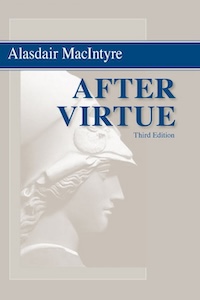After Virtue, Chapter 8
03 Nov 2025

After Virtue: A Study in Moral Theory, Third Edition
Alasdair MacIntyre
University of Notre Dame Press, 1981, 2007
Chapter 8 - AM further critiques social “science,” using his critique as a basis to investigate/critique power structures and authority of our own age in general.
What are the achievements of social science? Certainly nothing remotely scientific: e.g., lawlike, falsifiable generalizations. Rather:
1. generalizations coexist w/ counterexamples yet remain unfalsified
2. no scope modifiers or quantifiers to give precision
3. no set of counterfactual conditionals — they are more like observations, not laws (they are not even probabilistic)
Calls into question the supposed ancestry of the social sciences (i.e. Comte, Mill, etc.) and suggests rather a Machiavellian ancestry. Machiavelli saw social science as a project to minimize the influence of Fortuna (the unpredictability of human affairs)
Sources of unpredictability in human affairs:
1. Radical conceptual innovation (e.g. the wheel, relativity, quantum mechanics, etc. .. copernicus?)
2. One’s own future actions (also recall manipulated vs manipulator)
3. Game-theoretic character of social life - multiple games being played at once, sometimes without the knowledge of participants (hindsight reveals what “game” was being played)
4. Pure contingency / butterfly effect
[Here AM digresses, answering whether he thinks he’s disproved the kind of predictability the social sciences would like to suppose exists— to which he argues no, but that he’s demonstrated that such a concept is unintelligible]
On the other hand, what gives our life predictability?
1. Scheduling and coordinating
2. Statistical regularities (even if unexplained - e.g. suicide rises at Christmastime)
3. Regularity of nature
4. Causal regularities in social life (e.g. social status determines opportunities)
Predictability is necessary for us to engage in long-term projects which help our lives be meaningful; unpredictability enables us to be not merely the objects of somebody else’s project
Back to the question: what exactly is the character of social science?
It’s based on research but inductive; not lawlike; prefaced by qualifiers not quantifiers; etc. — in other words, it’s rooted in human life as we know it, which is to say, unpredictable.
On unpredictability:
1. Errors in social sciences, typically disregarded merely as failure, may be studied to learn more about how unpredictability affects human life
2. Even the project of maximizing predictability would have to cultivate flexibility in order to succeed — in other words, embrace unpredictability. This is why any form of totalitarianism (and bureaucratic control) are doomed to failure
Conclusion: the claim to managerial effectiveness and expertise is a contemporary moral fiction, arbitrary will and preference disguised by a false metaphysics — nobody is or could be actually in control.